Dhaka: “Don’t tell people you are an Indian journalist, you would not return in one piece,” snapped Muhammed Khan, a Dhaka-based retired private sector employee. “Ask yourself what you have done. People are extremely angry, hurt with the hate and misinformation you have spread about this movement,” he told ThePrint Friday, referring to the protest movement that culminated in the ouster of prime minister Sheikh Hasina.
“Harboured a killer, painted this movement as an attack on minorities … if I start listing why we are angry with India, you will fall short of pages in your notebook … disgraceful,” he remarked, raising his voice with each sentence before walking away.
Khan is not the only one in Bangladesh voicing these sentiments, though others are far less aggressive. They express that they are hurt and, while they believe friendship with India is essential, it will take a long time to heal and rebuild ties.
Hasina’s stay in India after she fled Dhaka, portrayal of the student movement as an issue of minority repression by the Indian media, undermining the broader context behind the movement, India’s support for Hasina on international platforms, and a sense of subordination attributed to New Delhi’s perceived dominance in the region are some sore points that have come to the fore in the aftermath of political turmoil in Bangladesh.
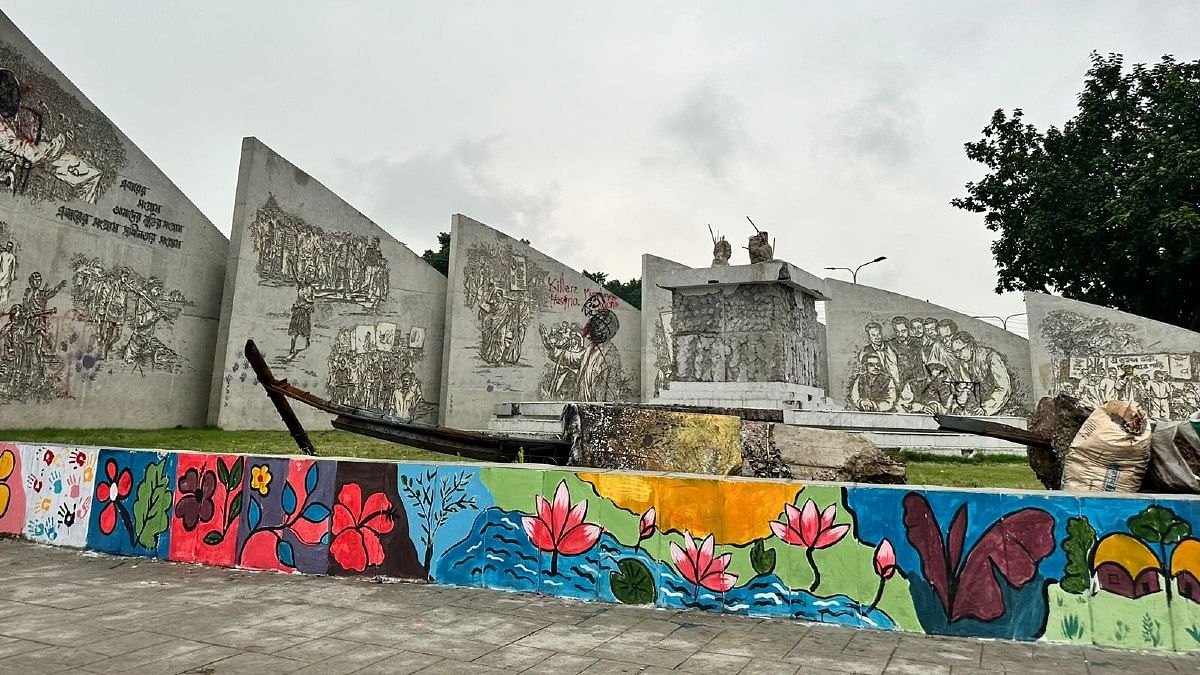
Flash floods that affected parts of eastern Bangladesh earlier this week, which many in the country alleged were a result of India opening the gates of a dam on Gumti river in Tripura have only added to the sentiments. This, despite Indian Ministry of External Affairs (MEA) spokesperson Randhir Jaiswal clarifying in a statement Thursday that the floods were caused due to waters from large catchments downstream of the Dumboor dam.
Also read: When protectors need protecting. Bangladesh Police resume work amid fears of being ‘lynched’
‘Friendship with India emboldened Hasina’
Back in the capital city of Bangladesh, Imam-ul-Haq, a Dhaka University student, asked ThePrint, “India has given shelter to Hasina, knowing what she did with her people. It makes us think that India is complicit. She tortured the students, rigged elections, got all opposition leaders arrested and India was the first to congratulate her. Why?”
Haq claims when Hasina fled on 5 August, everyone knew she would go to India.
“India has always supported her on international platforms. She was a dictator who crushed students, throttled democracy but still India supported her. The friendship with India is what emboldened her. When she fled we knew she would rush to her friend.”
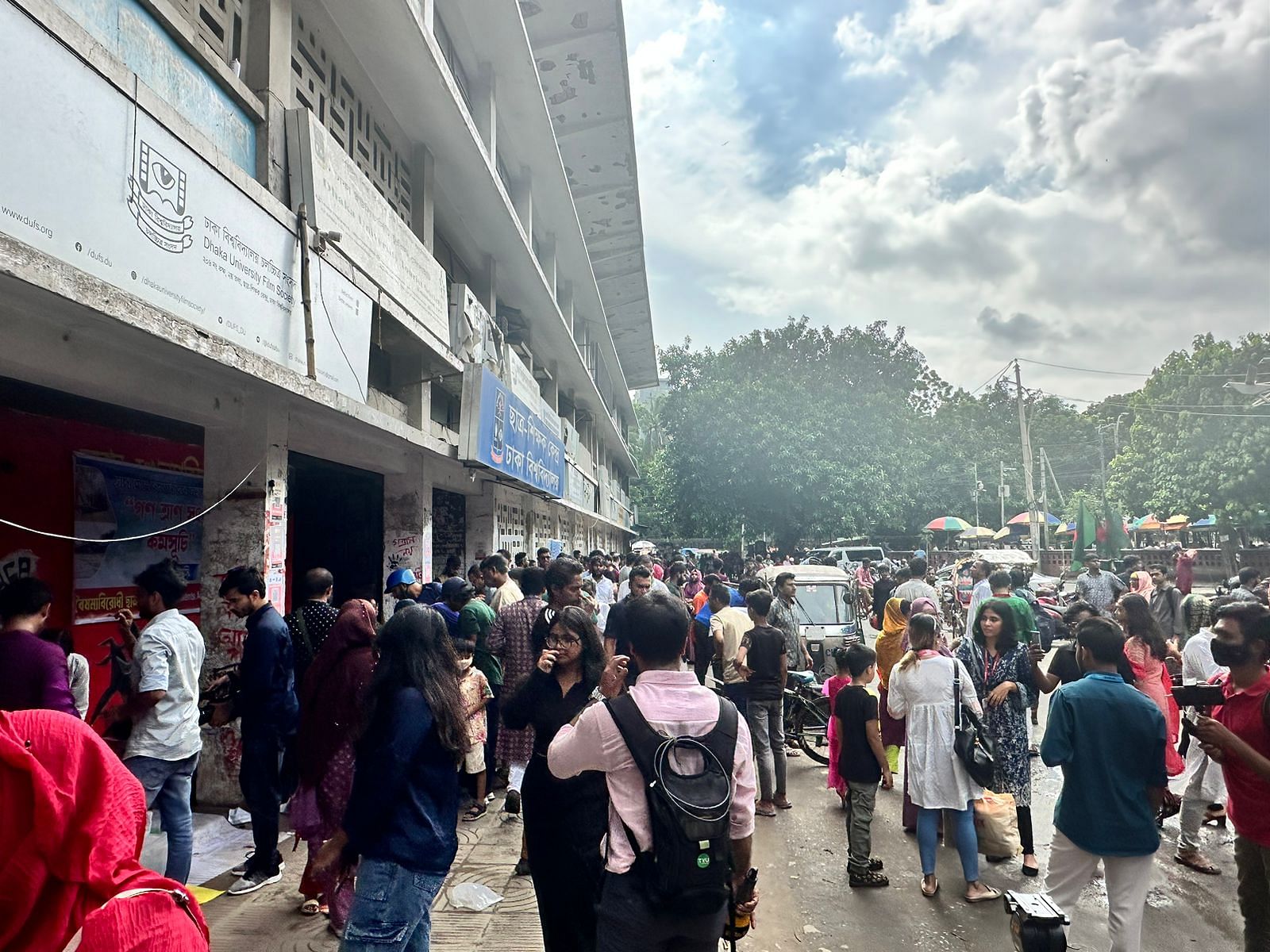
Haq complained that the deposed Awami League leader only thought of India and Indians and ignored Bangladeshis in the process. Hasina maintained her friendship with India and was always working to please them because she wanted to remain in power, he remarked.
“But India should have been smart. As the largest democracy they should be able to tell right from wrong. How did they stand with a leader who was getting her own people killed, stifling their voices?” asked Haq. He felt it would take a long time to restore trust toward India among the people of Bangladesh, especially after New Delhi granted Hasina “shelter”.
Grouse with Indian media & issue of ‘mutual respect’
Students, professors and volunteers including people employed by private companies in Bangladesh, accused sections of the Indian media of misrepresenting facts and painting the revolution to end autocracy in a wrong light.
A.B. Siddiqui, a 70-year-old retired professional, complained to ThePrint that quarters of the Indian media covered the protest movement as an attack on Hindu minorities, a “genocide”, while in reality, the protests were for the rights of all Bangladeshi citizens and had nothing to do with religion.
Pointing to a graffiti that read “religious discrimination will disappear”, Siddiqqui asked, “Have you heard anyone talking about religion? No.
“This was a revolution to fight against the atrocities, to save our country. The students were crushed, many killed but they emerged victorious, it has nothing to do with religion.”
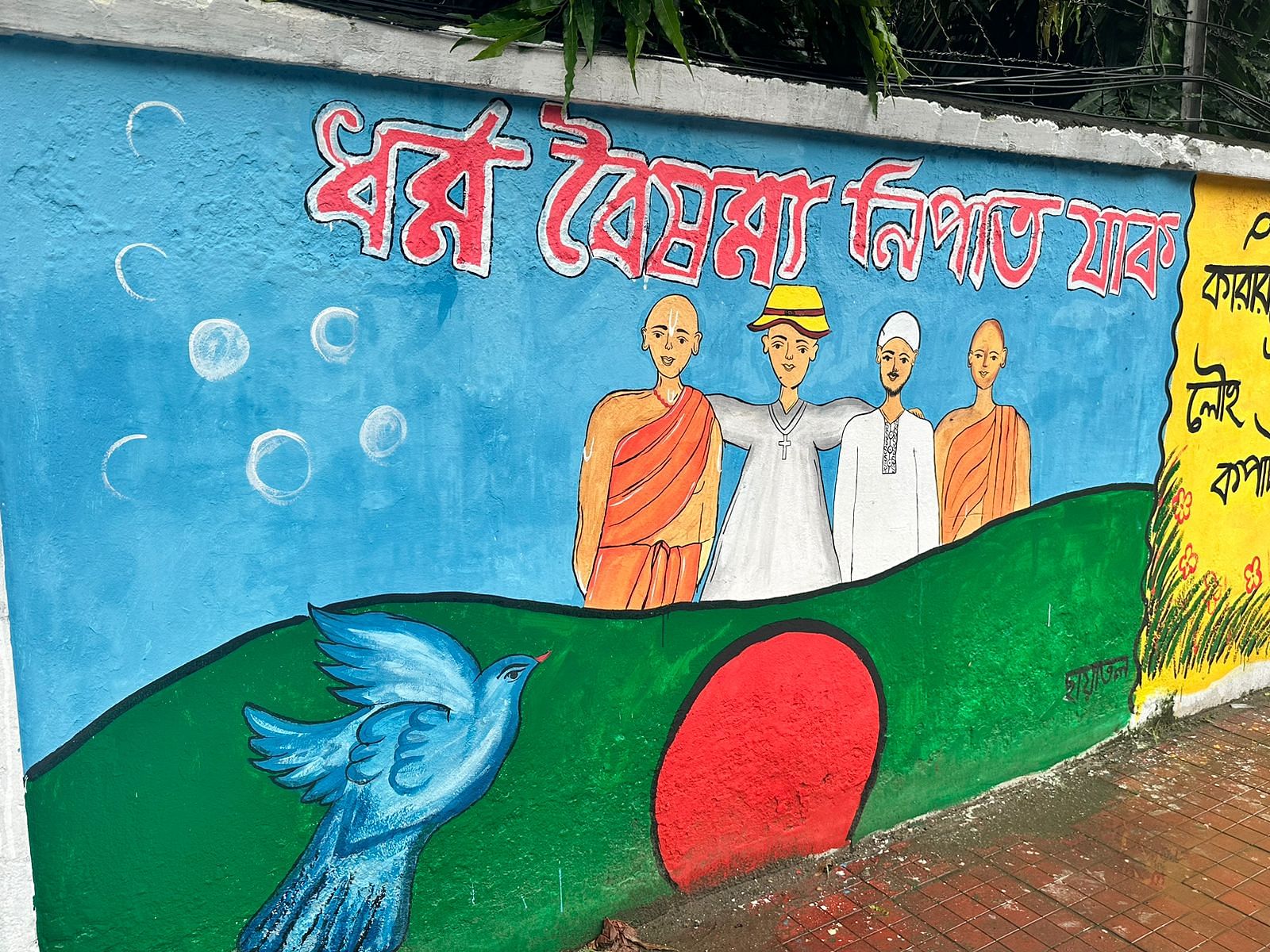
“But India did not leave any stone unturned to portray this to be a genocide. Why would they spread so much misinformation? Just because India is Hasina’s friend? Not expected from one of the largest democracies in the world,” he remarked.
Siddiqui acknowledged that there was lawlessness in parts of Bangladesh in the immediate aftermath of the collapse of Hasina’s government during which Hindus suffered but, according to him, religious minorities living in the country were never targets.
At least 11 Hindus were killed and 15 temples vandalised in the country in the last two months, shows data verified and available with the Bangladesh Puja Udjapan Parishad.
“It is unfortunate that Hindus suffered, but they were never a target. In fact, many volunteers who were Muslims were stationed outside to protect these temples. More than 400 people, most of them students, lost their lives, so many police stations were vandalised, but this was not a genocide as projected by the Indian media,” said Siddiqui.
Muhammed Delwar, a student of philosophy at Dhaka University, told ThePrint that India also needs to stop behaving like a “superior”.
“India’s politicians label Bangladeshis as intruders and termites, making us feel small. Then they always behave like the more superior power, making us feel like subordinates. They may be more developed, but that doesn’t mean we have no self-respect. Maybe Hasina took this treatment to maintain her friendship, but not anymore.”
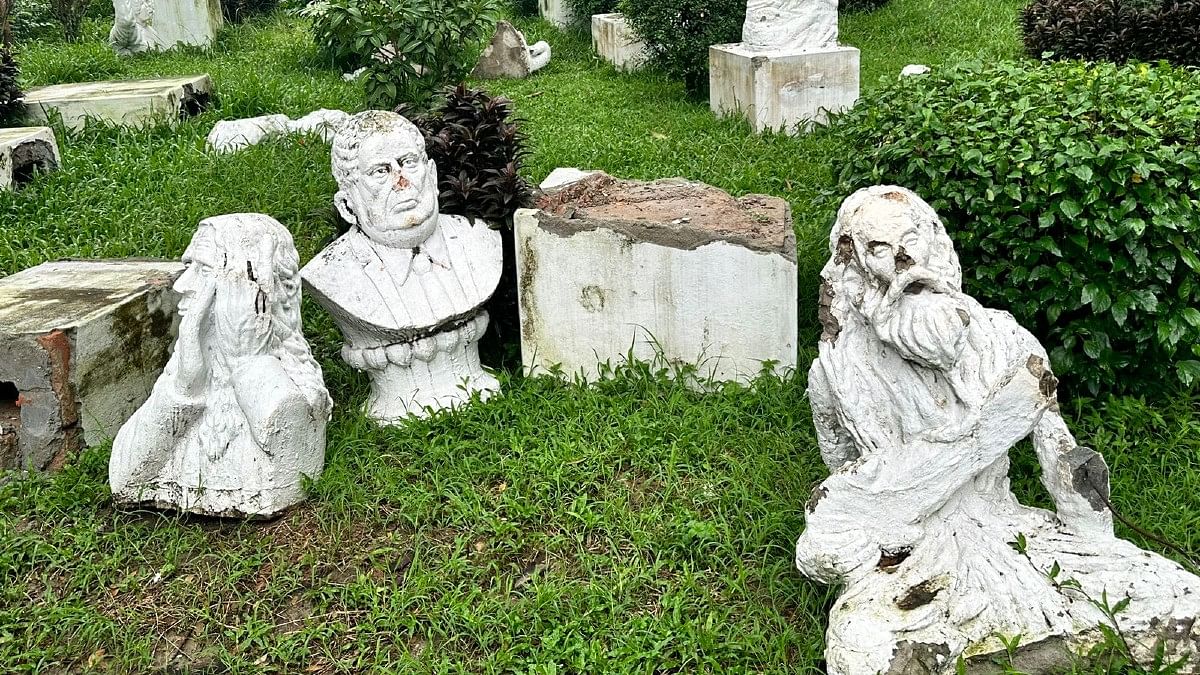
Adding that the anti-India sentiment is very strong among the youth in Bangladesh, he added that it will take a lot to rebuild this relationship.
But Haq, quoted above, had a different take. The people of Bangladesh, he said, are open to having good relations with India, provided they are “treated with respect”.
“We want to love India, have good relations but India wants to dominate us all the time. If India can be like a friend, where there is mutual respect, then it will be good,” he said.
Floods in Bangladesh become latest flash point
In one section of Dhaka University, posters can be seen referring to “India’s conquest”.
The posters are a reference to floods that have affected parts of 11 districts including Feni, Comilla, Noakhali, Lakshmipur, Brahmanbaria, Chittagong, Cox’s Bazar, Khagrachhari, Sylhet, Moulvibazar and Habiganj. According to reports in Bangladeshi media, at least 15 lives have been lost and 4.8 million affected by the floods triggered by heavy rains.
Nahid Islam, information and broadcasting adviser to the interim government led by Muhammed Yunus, alleged earlier this week that India exhibited “inhumanity” by opening a dam without prior notice, causing floods in eastern Bangladesh. He also urged the Government of India to reconsider its “anti-people policy” when it comes to Bangladesh.
The student activist-turned-administrator also requested New Delhi to get rid of “tensions between the two countries so that bilateral ties can be rebuilt on the basis of fairness”.
This seems to have struck a chord with those in Bangladesh already angry with India.
“India should have told us before opening the dam so that at least the people would have relocated and gone to a safe place. India has to be considerate about these things,” said Mishkat, another student at Dhaka University.
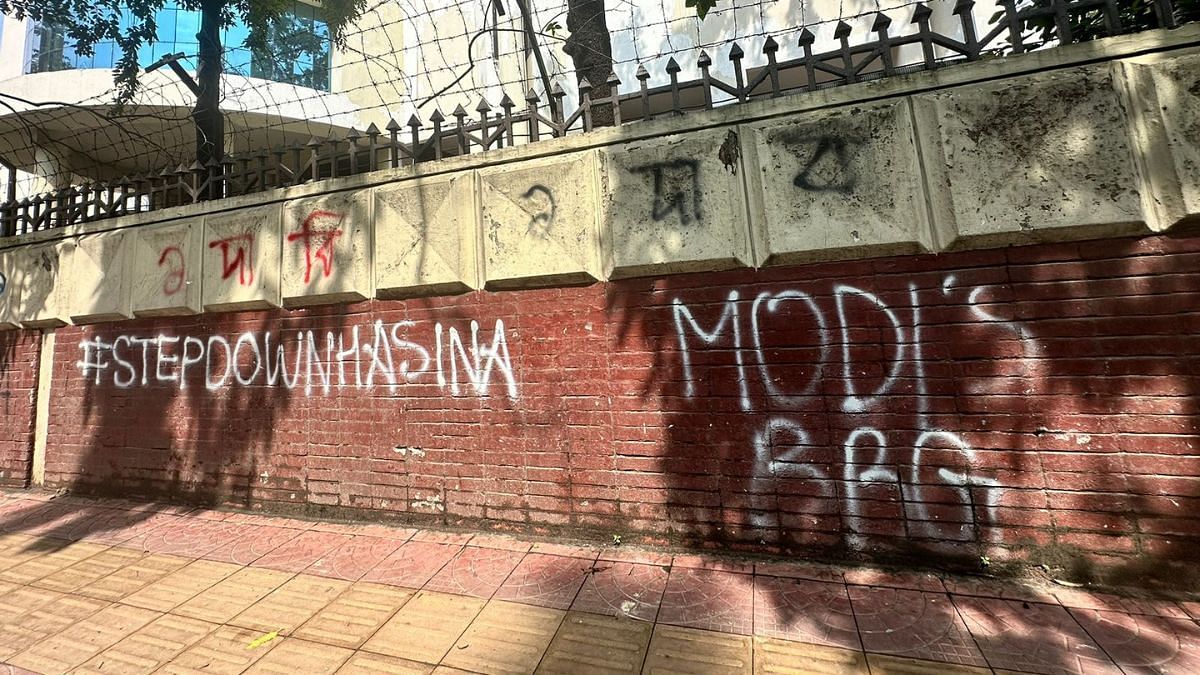
On its part, the Indian foreign ministry has already dismissed the allegations as factually incorrect. MEA spokesperson Jaiswal said the dam in question is located more than 120 km upstream of Bangladesh and is a low dam—less than 30 metres high.
He further stated that owing to heavy rainfall in Tripura and adjoining districts of Bangladesh since Wednesday, “automatic releases have been observed”.
India-Bangladesh share 54 common cross-border rivers, and river water cooperation is an important part of our bilateral engagement, Jaiswal said, adding that India is committed to mutually resolving such concerns through bilateral consultations and technical discussions.
(Edited by Radifah Kabir)



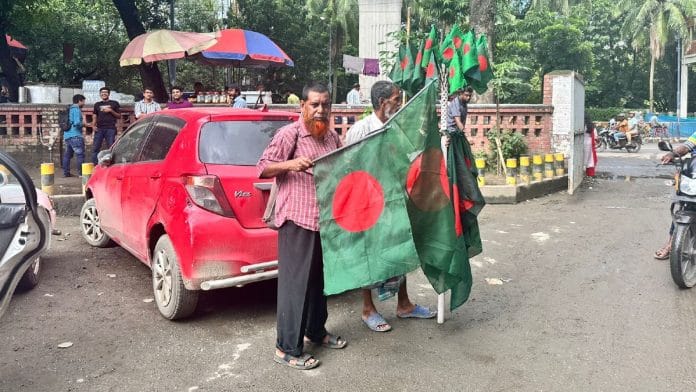



India does not need Bangladesh. Just like it does not need Pakistan.
India must realize the futility of seeking friendly relations with Muslim majority neighbours. These nations are nothing but a nuisance to the world and a headache for India. Nothing is to be gained by engaging with them.
Rather, we must downgrade our ties with these nations. No visas are to be issued to Pakistanis and Bangladeshis.
Our economy is not dependent on theirs. We are doing well and we will continue to do well. All we need to do is focus on our own economy and initiate labour and land reforms.
How funny is it that anecdotes of perception should be taken seriously and the advisors repeated pleas to Bangladeshis not to attack minorities just ignored ? The fact that Bangladeshi minorties came out in huge number to protest against attacks on them is testament to the fact that they have been attacked under the garb of protests against Hasina government. Any person glossing over it and pointing fingers at India is merely masquerading as a genuine protestor and trying to paint it as anger against India . Isn’t repeated attacks on Bangladeshi Hindus a well documented phenomenon under both Hasina and Khaleda Zia governments ?
Rubbish article. These india hater Bangladeshis should go to hell. Bangladesh ows it’s birth to India. Now the same Bangladeshis are acting ahsanfaramosh because of the terrorist jaamat ul islamic supporter faction of Bangladeshis.
One constructive takeaway from recent events in Bangladesh. Earlier in the Maldives. Off and on in Sri Lanka and Nepal. All democracies, so it is not a cliche to say sovereignty resides in the people, not just the government of the day. We should invest more in ensuring that India is well regarded by people in these countries. An enduring asset for our diplomacy.